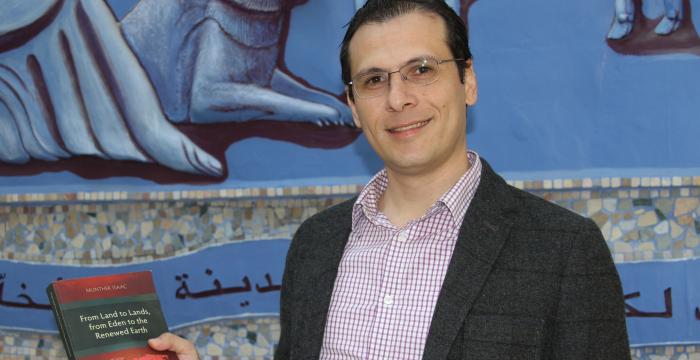How do Palestinians perceive Christian Zionism? I will argue, that Christian Zionism is more than just a theological belief about Israel and Jews – it is an Imperial Theology. Today, it is also – willingly or not – a political movement

By Rev. Dr. Munther Isaac, Reverend at Bethlehem Christmas Church and Academic Dean at Bethlehem Bible College
How do Palestinians perceive Christian Zionism? I will argue, that Christian Zionism is more than just a theological belief about Israel and Jews – it is an Imperial Theology. Today, it is also – willingly or not – a political movement. Let me start with a short definition of Christian Zionism as Robert Smith defines it:
Christian Zionism is political action, informed by specifically Christian commitments, to promote or preserve Jewish control over the geographic area now comprising Israel and Palestine.
With this paper I want to show that Christian Zionism is an Imperial Theology. These thoughts are the result of years of engagement with evangelical Christians around the issue of Palestine and Israel. The quotes I will use are representative of what I heard over the years. My aim is not to attack individuals, but beliefs and positions.
A Chosen State!
Christian Zionists emphasize that the Jews are the chosen people of God today, and with that chosenness comes entitlement and privilege. This is not simply a theological belief about the Jewish people. But with the modern state of Israel being confused with the Jews and biblical Israel, any opposition to the state of Israel or the occupation is deemed anti-Jewish, and by implication anti-God!
Joel Rosenberg, a regular Fox News analyst and NY Times bestseller, explains that if the US would turn against Israel, this would result in an existential threat to the future of the United States. Rosenberg, like numerous others, bases this on Genesis: “In Genesis 12:1-3, the Lord God vows that He will bless those who bless Israel and the Jewish people, and curse those who curse them.” What amazes me is that Gen. 12:1-3 does not actually mention Israel. It is about Abraham. This verse comes in the midst of a glorious mandate to Abraham to become a blessing to the nations – a mandate that was eventually fulfilled in Jesus, who is Abraham’s seed according to Paul, when he died on the cross. How was this glorious promise turned into the recipe of foreign policy today towards a secular state?
Justice Relativized
In this rational even the justice of God is relativized or qualified – it is relative to Christian Zionists presuppositions. As such, Daniel Juster, a Messianic Jewish theologian, can argue: if Palestinians refuse to recognize what God says about the Jewish people and their connection to the land of Israel, then suffering will result. Justice in regards to the Land requires that there be a submission to what God has declared about this Land. So if the Palestinians do not acknowledge God’s promise, they are foundationally unjust and are themselves resisted by God and lose their rights in the Land. The quote speaks for itself.
Control the narrative
Christian Zionism is strong and powerful in controlling the narrative. Language here matters. Consider, for example, the notion that Jews “returned” to “their” Land. So, now, if someone who is born in Russia today can prove that his grandmother is Jew, he has more right to live in this land than a Palestinian refugee who was born here and who can trace his roots in the land for hundreds if not thousands of years. We can also speak here about the role of archaeology and historiography, where Palestine is portrayed as ‘virtually barren, desolate and empty, waiting to be made fertile and populated by Israel.’
Palestinians Dehumanized
There is also a double standard when it comes to contemporary realities. Almost every time I speak to a Christian Zionist group I am asked: “Do you acknowledge Israel’s right to exist?” It is quite amazing to me that I, the occupied am being asked to recognize the right of my occupier to exist! Does Israel acknowledge my right to exist? And do you as Christians who seek to defend Israel give me the right to exist and the right for self-determination? The same applies about self-defense. Christian Zionists insist that Israel has the right to defend itself. But do Palestinians have the right to defend themselves when their land is confiscated or when settlers burn their fields or homes? A theology that privileges a people group produces prejudice and even bigotry. In the theology of Christian Zionism, Palestinians are often viewed as an irrelevant after-thought. They are secondary to the interest of Israel. From the very beginning, even before the birth of Zionism, Lord Shaftesbury (who was president of the London Society for Promoting Christianity Amongst the Jews (now known as CMJ)) argued for: “A country without a nation for a nation without a country”. I often wonder, did he know that the country had a nation? I am sure he did, but you see, we were irrelevant. There was something more important. This, I believe reflects a typical colonial – dare I say even Christian – mentality. The land had people, but they can be easily moved.
Fear
This attitude of marginalizing becomes dehumanizing - and even the demonizing is utilized to create fear. Christian Zionism instills fear! Today, it is so easy to portray the Arabs and Islam as the enemy that we all need to fight and unite against. The world is divided into “good” vs. “evil”. The tragic persecution of Christians in the Middle East has provided the perfect opportunity for some to make political gains. This is why it suits many people in the West to characterize the conflict in Palestine as a religious one, where the good becomes the Judeo-Christian tradition (us), and the evil is Islam (them: the Palestinians). This, in return, justifies actions by Israel as war on terror, even fighting the war of God!
Judeo-Christian Tradition and Cultural Superiority
One of the common phrases we hear today in many Christian circles is the reference to the “Judeo-Christian” tradition or values. There is no time to consider the roots of this phrase. At first glance the phrase seems to affirm the common roots of Christianity and Judaism. Clearly, such an affirmation was and is needed in response to years of anti-Judaism. The problem however is that the term is used today in such a way that it communicates superiority and prejudice. I am more and more convinced that the use of this term today has come to refer to cultural superiority. Mitri Raheb says, “It is utilized theologically and implicitly against the Palestinian people and within the context of the clash of civilization against Islam.”
“Proper” Theology
Christian Zionism has no place for opposing views. You are either a Christian Zionist or anti-Semite! There is no middle ground. As a result, Palestinian Christians must conform to the Christian Zionist theology or else we are heretics or anti-Semites! This, again, reflects a mentality of superiority, a colonial mentality. Don’t get me wrong. We do reject and condemn any theology that teaches that God rejects the Jewish people today, or that they are cursed, or that the Jews of today are to be blamed for the death of Christ. But to demand from us that we should endorse Christian Zionist beliefs about the Jewish people and the land in order to have the right to protest our 68 years of tragedy is unacceptable!
A Kingdom of Meekness: An Alternative
The theme of the Christ at the Checkpoint conference is ‘the Gospel in the Face of Religious Extremism.’ We should offer a Gospel response – a Gospel message. Jesus’ theology – his kingdom theology – is solidarity with the marginalized! Who were his friends? Whom did he honor? Where did he mostly preach? This is important! Jesus never let fear cripple him from meeting people – even the rejected and despised. What I call for is for Christians to reclaim the ethics and life style of Jesus, if we claim that he is the LORD - and to live out and declare what I will call a “Kingdom of Meekness”. Probably the best place where we find this is the sermon on the mount, and in particular in the Beatitudes. I suggest that we read the Beatitudes as Jesus’ way of challenging the empire. Consider for example the qualities Jesus introduces for the people of the kingdom and how radically these qualities are different from those of the empire. The poor in spirit – not the proud. Those who mourn – not those who live in prosperity. The meek – not the powerful; not empire builders. Those who hunger and thirst for justice – not for money, comfort, power, or fame. The merciful – not the powerful or the ruthless. The pure in heart – not those who seek a “pure” society. The peacemakers – not those who are indifferent to suffering! Those persecuted for justice’s sake – not the ones who stay in their comfort zone and do not speak the truth.
Jesus’ way, his kingdom way, is radically different than that of the empire, from that of Christian Zionism. Jesus said: “Blessed are the Meek, for they shall inherit the Land”. The Meek – the powerless – empowered by truth and love – inherit the Land – any land. This is the Gospel in the face of power and extremism. Amen.
About the author:

Rev. Dr. Munther Isaac (PhD, Oxford Centre for Mission Studies) is assistant professor at Bethlehem Bible College
and director of the Influential Christ at the Checkpoint conferences. He is also a Reverend at the Evangelical Lutheran Church
in Jordan and the Holy Land. His PhD research focused on the theology of the Promised Land.